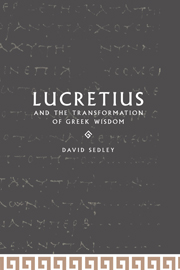Book contents
- Frontmatter
- Contents
- Preface
- Introduction
- Chapter 1 The Empedoclean opening
- Chapter 2 Two languages, two worlds
- Chapter 3 Lucretius the fundamentalist
- Chapter 4 Epicurus, On nature
- Chapter 5 Lucretius' plan and its execution
- Chapter 6 The imprint of Theophrastus
- Chapter 7 The transformation of book I
- Epilogue
- Bibliography
- Index locorum
- General index
- Index of modern scholars
Chapter 1 - The Empedoclean opening
Published online by Cambridge University Press: 22 September 2009
- Frontmatter
- Contents
- Preface
- Introduction
- Chapter 1 The Empedoclean opening
- Chapter 2 Two languages, two worlds
- Chapter 3 Lucretius the fundamentalist
- Chapter 4 Epicurus, On nature
- Chapter 5 Lucretius' plan and its execution
- Chapter 6 The imprint of Theophrastus
- Chapter 7 The transformation of book I
- Epilogue
- Bibliography
- Index locorum
- General index
- Index of modern scholars
Summary
CICERO'S LETTER
Lucreti poemata ut scribis ita sunt, multis luminibus ingeni, multae tamen artis. sed cum veneris, virum te putabo si Sallusti Empedoclea legeris, hominem non putabo.
Writing to his brother in 54 bc, Cicero supplies two unique testimonies (Ad Q. fr. II 9.4). In the first sentence he echoes Quintus' admiration for Lucretius' poem, thus providing the sole allusion to the De rerum natura likely to be more or less contemporary with its publication. In the second, he attests the publication of an Empedoclea by a certain Sallustius, presumably a Latin translation or imitation of Empedocles (compare Cicero's own near-contemporary use of the title Aratea for his translation of Aratus).
But even more striking than the two individual testimonies is their juxtaposition. Modern editors have taken to printing a full stop after sed cum veneris, understanding ‘But when you come … (sc. we will discuss it).’ This suppresses any overt link between the two literary judgements: the first breaks off abruptly with an aposiopesis, and the second, juxtaposed, is to all appearances a quite independent observation. On the equally natural and more uent reading that can be obtained simply by reverting to the older punctuation, as printed above, with a comma instead of the full stop, the letter is an explicit comparison between the DRN and the Empedoclea:
Lucretius' poetry shows, as you say in your letter, many flashes of genius, yet also much craftsmanship. On the other hand, when you come, I shall consider you a man if you have read Sallustius' Empedoclea, though I won't consider you human.
- Type
- Chapter
- Information
- Lucretius and the Transformation of Greek Wisdom , pp. 1 - 34Publisher: Cambridge University PressPrint publication year: 1998
- 1
- Cited by



